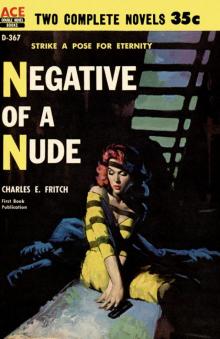- Home
- Charles E. Fritch
The Odyssey of Sam Meecham Page 2
The Odyssey of Sam Meecham Read online
Page 2
him, determined, demanding.
Sam said, "All right, I'll take it back."
She smiled condescendingly, like a mother does when a child admits awrongdoing.
Conditioned responses, Sam thought bitterly; that was the whole trouble.This cravenness, this kowtowing before any idiot with a louder voice,certainly wasn't in his genes. The trouble was in his conditioning,started when he was an adolescent. Give somebody an inch and they'lltake two. Pretty soon they're walking all over you, and you've become soused to it you don't complain.
He thought of his job, of the eternal fitting of two wires in place. Hewas a cog and nothing more--a cog that could be replaced as swiftly, asefficiently as any part of an assembly-line atomic engine could bereplaced. He looked up into the blank, smiling, self-satisfied face ofhis wife. He thought of the stars beckoning overhead. The _stars_!
"No," he said suddenly, decisively. The word fell like a sledgehammerblow in the stillness of the room.
Dorothy's vacuous smile faded, uncomprehending. "What?"
"No," Sam said, trying to keep his voice even. "I've changed my mind.I'm keeping the engine whether you like it or not."
Dorothy's mouth hung open in surprise, and before she could recoverenough to launch a fresh tirade Sam Meecham had walked out, slamming thedoor behind him. He paused in the cool evening and gazed upward. Thegovernment had gone only to the Moon. Sam Meecham was going to thestars!
The next day he was given the silent treatment. It had begun the nightbefore when he returned from his walk. Dorothy was in bed, awake andsniffling over the cruelty inflicted upon her by an unthoughtfulhusband, and when he came in she turned her back and wouldn't speak. Samdidn't mind that; in fact, it was a welcome relief. But all night longshe sniffled into her pillow, trying to win him over.
Sam felt an odd mixture of sympathy and anger. "Oh, shut up," he saidfinally, and stuck his head under the pillow.
In the morning the treatment continued, but it was not totallysilent--for Dorothy's air of hostility was now accompanied by low,sometimes indistinct mumblings.
Suddenly Sam said, "This coffee's cold."
"If you don't like it," Dorothy said, and thrust her face near his,"make some yourself."
Sam half-rose and gripped the table. "Look, my lovely one, _I'm_ thegent who brings home that weekly paycheck you can't get along without.Measly or not, it's good, honest American dough that lets us live alittle decently--and the least _you_ could do is give me warm coffee inthe morning!"
His voice had risen almost to a shout and Sam himself was surprised atit. Dorothy's eyebrows crept into a bewildered frown, and like one in atrance she moved to turn on the heat beneath the coffee pot.
Sam's heart was beating swiftly as he sat down. Conditioned responses,he thought a little wildly. He'd started it off last night by defyingDorothy--and now, bit by bit, it was becoming easier. All he'd have todo was keep it up, see that he didn't lapse.
He sipped the coffee slowly, as if tasting his recent triumph in theblack liquid.
"You'd better hurry," Dorothy said, looking at him a little uneasily.
Sam glanced at the wall clock and began gulping the hot liquid. Ten ofeight! He'd have to hurry. He paused suddenly, the cup in mid-air, andwondered. Hurry to what? To those two wires and the tester and theendless stream of untested engines flowing toward him?
With an infinite firmness, Sam Meecham placed his cup on the saucer."I'm not going in," he said.
Dorothy looked at him as though he were crazy. "What do you mean, you'renot going in?" she demanded. "Just because you've got some mulish notionin your head, do you think we have to starve? You're going in and likingit."
"The engine I bought is coming today," he said in a quiet voice. "I wantto install it." In Sam Meecham's eyes there was a deadly fire that evenhis wife had not seen before. She gulped and backed away a little.
"But--"
"Call up the foreman," Sam said. "Tell him I'm sick. No, wait." Hepaused, smiling coldly. That would leave him an out; he could always goback to the job if he changed his mind. He said slowly, "Tell him I'vequit."
"_Sam!_"
"Tell him I've quit," Sam insisted. That was the thing. Burn yourbridges behind you so you can't turn back, so the only road is ahead.
Sam Meecham was going to the stars, and he would never return!
The atomic engine came that afternoon, neat and shiny and sleek, withall the wires in their proper places, checked and double-checked by asober human cog in the prison from which Sam Meecham had just escaped.
Sam busied himself in the hangar, lifting out the old engine andreplacing it with the new one. Carefully, he settled it into its housingand bolted it down. Then he rearranged the wires into the patternoutlined on the sheet of paper.
Dorothy brought him coffee. That surprised him but he accepted itgratefully.
"Can--can I help you, Sam?" she offered.
He looked at her, perhaps a little disappointed that her face wasserious. He said, "Sure you're not just trying to be nosey?"
A sharp pain darted into her eyes and she turned away.
"Wait," he said.
He called himself a fool. It was another of her tricks and he wasfalling for it. He put a restraining hand on her arm and rememberedanother time eight years ago when the touch would have sent electricthrills coursing through him. Oddly, he felt a small remnant of thepleasure stir within him.
"All right," he said gruffly. "All right, you can help."
So he was a fool. He'd been a fool before and chances were he'd be oneagain more often than he'd care to admit. In a short while, hoursperhaps, he'd be gone--and he'd never see Dorothy again. Somehow thethought was not as comforting as he had expected, and he tried to workoff a lingering doubt that rose to plague him.
They worked through the afternoon, testing any weak parts the rocketmight have, bracing the struts, checking for leaks. Sam found twospace-suits in the locker. He'd better leave one, he thought. They wereexpensive and Dorothy might need one sometime. With him gone, shecouldn't afford to throw money around. Yet he might need it more thanshe ever would. For a minute he stood undecided, and then he put themboth in the locker.
Dorothy came into the room and smiled wearily at him. "It'll go anyplace now," she told him proudly.
In her eyes Sam saw an indefinable something. Something he might haveseen eight years ago--but mixed with it was a sadness he had not knownshe could possess. Guiltily, he turned his gaze away.
"We--we'd better go in and eat," he said, looking at his watch withoutseeing it.
She didn't say anything, and that was odd. Sam wished she would nag andcomplain as she always had before. He wondered why he wished that, whenonly a short time before he had wanted just the opposite. It was with astart that he realized the reason. He was running away. That was it. Hewas running away, and he wanted to be deathly certain that he had goodcause to run. Slowly the suspicion was creeping over him that thesituation had changed slightly, was changing more.
He would leave tonight, he told himself, before he weakened enough toshelve his plans for another comfortable rut.
Sam's voice was a little hoarse. "What are you doing here? What do youwant?" He had finished loading enough supplies aboard the rocket to lasthim months.
Dorothy came toward him from the darkness.
"It's no use," he said. "You can't talk me out of it this time."
But she only smiled sadly and said, "I know that, Sam. I came to saygood-bye."
"Good-bye?"
"You're leaving, aren't you?"
"Yes." He looked at the ground, studying the darkness.
"I'm sorry, Sam," she said. "We started out wrong. Maybe, if we triedagain--"
But Sam said quickly, "No. I'm sorry too, but people don't change."
The remark startled him. He had used it occasionally to rationalize hisposition, had been convinced of its undeniable truth--yet suddenly herealized that he himself was its living denial. People _could_ change,just as he had changed, just a
s Dorothy could change. It had been partlyhis fault when he first gave in to something he didn't want to do, andthen to something else, and something else after that. He had helped digthe rut in which he had found himself, taking it for granted just asDorothy had taken it for granted.
Her hair was soft in the same moonlight that had shone eight yearsbefore, and Sam Meecham felt a desire that had been too longunfulfilled.
"Dorothy, I--"
He hesitated. The decision came hard to him, for much of his life hadbeen devoted to giving in to the decisions of others. This was themoment he had been waiting for,
Sam said, "All right, I'll take it back."
She smiled condescendingly, like a mother does when a child admits awrongdoing.
Conditioned responses, Sam thought bitterly; that was the whole trouble.This cravenness, this kowtowing before any idiot with a louder voice,certainly wasn't in his genes. The trouble was in his conditioning,started when he was an adolescent. Give somebody an inch and they'lltake two. Pretty soon they're walking all over you, and you've become soused to it you don't complain.
He thought of his job, of the eternal fitting of two wires in place. Hewas a cog and nothing more--a cog that could be replaced as swiftly, asefficiently as any part of an assembly-line atomic engine could bereplaced. He looked up into the blank, smiling, self-satisfied face ofhis wife. He thought of the stars beckoning overhead. The _stars_!
"No," he said suddenly, decisively. The word fell like a sledgehammerblow in the stillness of the room.
Dorothy's vacuous smile faded, uncomprehending. "What?"
"No," Sam said, trying to keep his voice even. "I've changed my mind.I'm keeping the engine whether you like it or not."
Dorothy's mouth hung open in surprise, and before she could recoverenough to launch a fresh tirade Sam Meecham had walked out, slamming thedoor behind him. He paused in the cool evening and gazed upward. Thegovernment had gone only to the Moon. Sam Meecham was going to thestars!
The next day he was given the silent treatment. It had begun the nightbefore when he returned from his walk. Dorothy was in bed, awake andsniffling over the cruelty inflicted upon her by an unthoughtfulhusband, and when he came in she turned her back and wouldn't speak. Samdidn't mind that; in fact, it was a welcome relief. But all night longshe sniffled into her pillow, trying to win him over.
Sam felt an odd mixture of sympathy and anger. "Oh, shut up," he saidfinally, and stuck his head under the pillow.
In the morning the treatment continued, but it was not totallysilent--for Dorothy's air of hostility was now accompanied by low,sometimes indistinct mumblings.
Suddenly Sam said, "This coffee's cold."
"If you don't like it," Dorothy said, and thrust her face near his,"make some yourself."
Sam half-rose and gripped the table. "Look, my lovely one, _I'm_ thegent who brings home that weekly paycheck you can't get along without.Measly or not, it's good, honest American dough that lets us live alittle decently--and the least _you_ could do is give me warm coffee inthe morning!"
His voice had risen almost to a shout and Sam himself was surprised atit. Dorothy's eyebrows crept into a bewildered frown, and like one in atrance she moved to turn on the heat beneath the coffee pot.
Sam's heart was beating swiftly as he sat down. Conditioned responses,he thought a little wildly. He'd started it off last night by defyingDorothy--and now, bit by bit, it was becoming easier. All he'd have todo was keep it up, see that he didn't lapse.
He sipped the coffee slowly, as if tasting his recent triumph in theblack liquid.
"You'd better hurry," Dorothy said, looking at him a little uneasily.
Sam glanced at the wall clock and began gulping the hot liquid. Ten ofeight! He'd have to hurry. He paused suddenly, the cup in mid-air, andwondered. Hurry to what? To those two wires and the tester and theendless stream of untested engines flowing toward him?
With an infinite firmness, Sam Meecham placed his cup on the saucer."I'm not going in," he said.
Dorothy looked at him as though he were crazy. "What do you mean, you'renot going in?" she demanded. "Just because you've got some mulish notionin your head, do you think we have to starve? You're going in and likingit."
"The engine I bought is coming today," he said in a quiet voice. "I wantto install it." In Sam Meecham's eyes there was a deadly fire that evenhis wife had not seen before. She gulped and backed away a little.
"But--"
"Call up the foreman," Sam said. "Tell him I'm sick. No, wait." Hepaused, smiling coldly. That would leave him an out; he could always goback to the job if he changed his mind. He said slowly, "Tell him I'vequit."
"_Sam!_"
"Tell him I've quit," Sam insisted. That was the thing. Burn yourbridges behind you so you can't turn back, so the only road is ahead.
Sam Meecham was going to the stars, and he would never return!
The atomic engine came that afternoon, neat and shiny and sleek, withall the wires in their proper places, checked and double-checked by asober human cog in the prison from which Sam Meecham had just escaped.
Sam busied himself in the hangar, lifting out the old engine andreplacing it with the new one. Carefully, he settled it into its housingand bolted it down. Then he rearranged the wires into the patternoutlined on the sheet of paper.
Dorothy brought him coffee. That surprised him but he accepted itgratefully.
"Can--can I help you, Sam?" she offered.
He looked at her, perhaps a little disappointed that her face wasserious. He said, "Sure you're not just trying to be nosey?"
A sharp pain darted into her eyes and she turned away.
"Wait," he said.
He called himself a fool. It was another of her tricks and he wasfalling for it. He put a restraining hand on her arm and rememberedanother time eight years ago when the touch would have sent electricthrills coursing through him. Oddly, he felt a small remnant of thepleasure stir within him.
"All right," he said gruffly. "All right, you can help."
So he was a fool. He'd been a fool before and chances were he'd be oneagain more often than he'd care to admit. In a short while, hoursperhaps, he'd be gone--and he'd never see Dorothy again. Somehow thethought was not as comforting as he had expected, and he tried to workoff a lingering doubt that rose to plague him.
They worked through the afternoon, testing any weak parts the rocketmight have, bracing the struts, checking for leaks. Sam found twospace-suits in the locker. He'd better leave one, he thought. They wereexpensive and Dorothy might need one sometime. With him gone, shecouldn't afford to throw money around. Yet he might need it more thanshe ever would. For a minute he stood undecided, and then he put themboth in the locker.
Dorothy came into the room and smiled wearily at him. "It'll go anyplace now," she told him proudly.
In her eyes Sam saw an indefinable something. Something he might haveseen eight years ago--but mixed with it was a sadness he had not knownshe could possess. Guiltily, he turned his gaze away.
"We--we'd better go in and eat," he said, looking at his watch withoutseeing it.
She didn't say anything, and that was odd. Sam wished she would nag andcomplain as she always had before. He wondered why he wished that, whenonly a short time before he had wanted just the opposite. It was with astart that he realized the reason. He was running away. That was it. Hewas running away, and he wanted to be deathly certain that he had goodcause to run. Slowly the suspicion was creeping over him that thesituation had changed slightly, was changing more.
He would leave tonight, he told himself, before he weakened enough toshelve his plans for another comfortable rut.
Sam's voice was a little hoarse. "What are you doing here? What do youwant?" He had finished loading enough supplies aboard the rocket to lasthim months.
Dorothy came toward him from the darkness.
"It's no use," he said. "You can't talk me out of it this time."
But she only smiled sadly and said, "I know that, Sam. I came to saygood-bye."
"Good-bye?"
"You're leaving, aren't you?"
"Yes." He looked at the ground, studying the darkness.
"I'm sorry, Sam," she said. "We started out wrong. Maybe, if we triedagain--"
But Sam said quickly, "No. I'm sorry too, but people don't change."
The remark startled him. He had used it occasionally to rationalize hisposition, had been convinced of its undeniable truth--yet suddenly herealized that he himself was its living denial. People _could_ change,just as he had changed, just a
s Dorothy could change. It had been partlyhis fault when he first gave in to something he didn't want to do, andthen to something else, and something else after that. He had helped digthe rut in which he had found himself, taking it for granted just asDorothy had taken it for granted.
Her hair was soft in the same moonlight that had shone eight yearsbefore, and Sam Meecham felt a desire that had been too longunfulfilled.
"Dorothy, I--"
He hesitated. The decision came hard to him, for much of his life hadbeen devoted to giving in to the decisions of others. This was themoment he had been waiting for,

 Negative of a Nude
Negative of a Nude Skin Game
Skin Game I Like Martian Music
I Like Martian Music